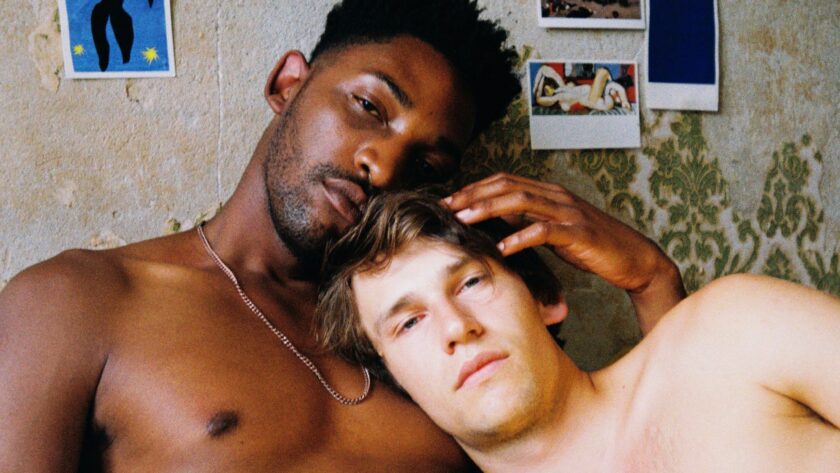Luigi Barraza Cárdenas reviews a romantic film set over a single day, following two young men as they navigate a serendipitous fling.
After everything we’ve been through over the last year, a random encounter on the dancefloor seems like a fever dream. A fever dream we all want. The feeling of losing oneself on the dancefloor is simultaneously so familiar and so distant, and, watching Daniel Sánchez López’s newest feature, I found myself craving its gleeful abandon. Told across a single day, Boy Meets Boy is a simple but beautifully told romance about being young, lost, and perhaps a bit dissatisfied with the world, despite being somewhat privileged and bursting with life.
Observing its subject from a distance, the film opens with a beautifully framed dancing sequence and a less classy but hilariously honest bedroom scene. At a Berlin nightclub, neon lights shine bright and music blasts loud. Two young men dance to the electronic rhythms of the night. The club scene is brief but manages to capture an honest depiction of the anxiety and pure electricity experienced when meeting a beautiful stranger at a club. In just a few shots, the film conveys the kinetic magnetism and explosive feeling of wanting and being wanted with an almost epistemological skill. Sure, ecstasy never hurt the escalation of euphoria and lust, but my point stands.

The audience is introduced to Johannes (Alexandros Koutsoulis), a young German dancer, and Harry (Matthew James Morrison), an English tourist finding hedonistic escapism in Berlin’s nightlife. After their encounter at the club, sheer serendipity pushes them out into the real world – the sunlit Berlinese streets – where the illusion of smoke and upbeat music can no longer protect them from reality. After all, they are just two (mutually attracted) strangers who may not even have anything in common. Harry is leaving Berlin tonight, after two days straight of partying, (Boy, have we all been there!) and Johannes offers a local perspective of the city, with a side of hopefully furthering their sexual interaction.
The film is pre-constructed as a tragic time-bomb, the clock always ticking on the young protagonists. We know that Harry will leave later that day, and despite our most romantic instincts, the film’s ambience is realistic enough that we know this is a story about introspection and self-reflection, not grand romantic gestures or resolve. It heavily borrows from Richard Linklater’s far superior (this writer might evoke the word ‘masterpiece’) Before Trilogy, particularly the first two installments, where tension and uncertainty rule. We are not in artsy Vienna or posh Paris but eclectic Berlin. Is it a straight rip-off of the concept? Perhaps. Do we care? Not really. This type of representation (even in independent cinema) is very important for the LGBTQIA+ community. We need simple stories about romance that depart from the tragic conventions that have dominated the genre so far. Sure, the world still needs stories that represent the struggles of the community, but it is refreshing to have ordinary love stories like Boy Meets Boy on our screens.
Further analyzing, something that I particularly enjoyed about Sánchez López’s film is the dialogue. The characters’ challenge of stereotypes and deconstruction of ideas about ‘gayness’ is refreshing to hear. It reinforces the idea that archetypes are super passé and that diversity within the community exists. It questions ideas of masculinity, fatherhood, and religion. Not all gay men want to have meaningless sex all the time. Not all sex needs to be sophisticated to be enjoyable or demoralizing. Gay men can love football as much as musical theatre. Gay men want monogamy as much as they want polyamory. The ultimate message is that there is no one ‘correct way’ of deviating from heteronormativity, and the message is completely empowering.

Despite its urban conversation approach, Boy Meets Boy is not without its intimate moments. Strong attention to detail and transient displays of affection develop an environment of excitement and insecurity. The camerawork complements the more sensorial aspects of being in hazy party-limbo and experiencing someone you want for the first time. Sánchez López boldly uses close-ups to capture small gestures and details of expressive body language. Boy Meets Boy comes off as almost documentary, despite having very clear intentions of what it wants us to see. When Harry and Johannes interact physically we can almost sense the tension and it is electrifying. Both Koutsoulis and Morrison give strong performances that carry the film’s hazy rhythm. Their delivery is organic and naturalistic to the point where you start wondering if they scouted nightclubs across Berlin for maximum effect.
The story eventually comes full circle visually, mirroring scenes from the beginning in the final minutes to highlight how simultaneously nothing and everything has changed for these characters. They have unabashedly challenged themselves and each other, yet their lives just go on. There is something extremely humane and relatable about how the more introspective themes are handled. Not all love stories are transcendental. Not all connections are profound. Not all people are fundamental. Ephemeral beauty can still be found in the non-permanent and mundane. Verbalizing our fears does not automatically cast them away. In the end, Boy Meets Boy intentionally leaves you with a bittersweet aftertaste, deftly encapsulating the trials and tribulations of being a privileged young millennial looking for love and connections in a complicated world.




